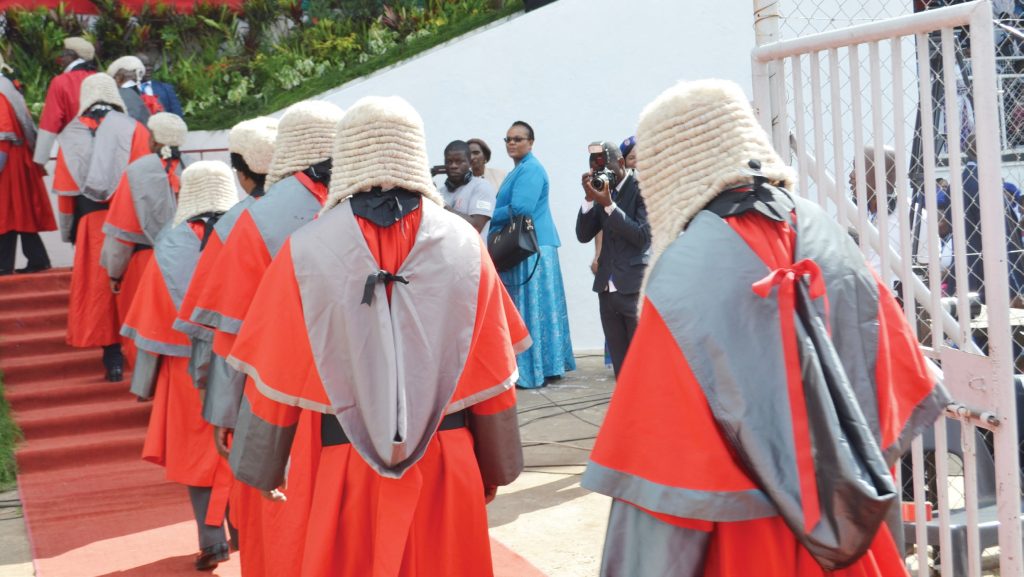Ministry yearns for dignified removal of judges
Supreme Court of Appeal and High Court judges will now be spared from public ridicule when they are removed from office for misconduct or incompetence.
The development follows a proposal to replace the current procedure that involves parliamentary debate.

The Ministry of Justice is preparing the Constitution (Amendment) Bill 2023 and the Judicial Service Administration Bill 2023 which seek to provide for a dignifying removal of the judges.
The Constitution (Amendment) Bill 2023 seeks to amend the Constitution to provide for, among other things, the establishment of a Judicial Service, the revision of the composition of the Judicial Service Commission (JSC) and an objective and dignifying removal process from office for judges.
In terms of removal procedures, the new Bill seeks to replace the current procedure, which requires that the matter be debated by members of Parliament (MP), passed by a majority of the votes of MPs present, then a petition be submitted to the President to remove the concerned judge.

Despite the provisions, no judge has ever been removed from office either for incompetence or misbehaviour.
The closest Parliament attempted to remove a judge was in 2001, when Justices Dunstain Mwaungulu (now retired) and the late Chimasula Phiri were accused of misconduct relating to judgements they had issued.
Parliament attempted to remove them but, then president Bakili Muluzi dismissed the impeachment charges against the two.
The new procedure of removing a judge from office will require the commission, upon receipt of a complaint against the conduct of a judge and which falls within the grounds for removal from office, to recommend to the President the appointment of an ad hoc tribunal to investigate the matter.
The tribunal shall consist of a chairperson, who shall be a retired Justice of Appeal, and such other members, being not less than two and more than four, which shall inquire into the matter and submit its report to the President and advise him or her whether the judge ought to be removed from office.
Further, the Bill suggests where the tribunal recommends to the President that the judge be removed from office, the President shall, after consulting with the commission and by an instrument under the Public Seal remove the judge from office.
The Bill also proposes that the President, after consulting with the commission, may just suspend the judge from performing the duties of his or her office or the President can revoke the suspension of the judge if the tribunal finds in his or her favour.
The proposals are basically among a number of reforms that were recommended in the 2007 Report of the Law Commission on the Review of the Constitution.
Malawi Law Society (MLS) president Patrick Mpaka in an interview yesterday said judicial officers, being professionals, the imperative to depoliticise their removal process was a welcome proposal from the ministry.
“The appointment of the membership of both the JSC and the proposed tribunal are transparent and apolitical by limiting the discretion of the President to appoint JSC members so that the majority of the members in JSC should be appointed following transparent nominations involving the public,” he said.
Mpaka also noted that the composition of the JSC was widened enough and made more representative of various interest groups, including the Legislature itself.
“There is adequate mechanism to make the JSC functional in enforcing the professional standards and the code of ethics for judicial officers, which should be adopted as part of the legislation,” he said.
Initially, the ministry had indicated last year that the Judicial Service Administration Bill 2023 was ready for tabling during the Mid-Year Budget Review Meeting of Parliament which took place from November 13 to December 8 2023.
However, it transpired that the two draft Bills were not ready as the ministry ultimately, on November 24 2023, forwarded them to Malawi Law Society and Judiciary for further review.
According to the plan of action adopted by the ministry on the Bills, MLS and the Judiciary are required to review the two draft Bills, conduct own consultations and provide feedback to the ministry by January 5 2024.
While confirming that Minister of Justice Titus Mvalo is on record as saying the Bill was ready for presentation during the November-December 2023 sitting of Parliament, Ministry of Justice spokesperson Frank Namangale said the tabling failed because the ministry ended up with three different draft Bills.
“So, we ended up with three draft Bills, one from the Judiciary, another from MLS and the third being the one the ministry drafted. So, with that scenario, we could not present our version to Parliament. In fact, we could not even take it to Cabinet,” explained Namangale.
But human rights and governance expert Undule Mwakasungula said the proposals in the Bill introduce important changes to the process of removing judges from office aimed at providing a more dignified and streamlined procedure.
“One of the key advantages of this proposal is that it reduces the level of political influence in the removal process of judges,” he said.
On his part, Catholic Commission for Justice and Peace national coordinator Boniface Chibwana observed that the Bill provides the much-needed procedures within which judges can be impeached.
Said Chibwana: “This is a great innovation on the part of the law in ordering to uphold judicial accountability. In this country, we have cried for judicial accountability for so long and this arm of government has been treated as a sacred cow that questioning its dealings has been deemed a misdemeanor. However, we should mention that the proposed law needs to be carefully examined.
“The suggested change in the law still gives the President too much power in the exercise findings of the tribunal. There is a need to depoliticise the process. There is also need to provide time limits on how long the tribunal should sit on a particular matter. So, while this is a welcome development, we need to strengthen the proposed law.”






Awesome! Its genuinely remarkable post, I have got much clear idea regarding from this post